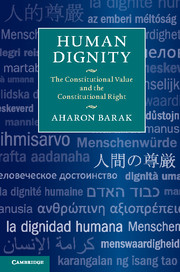Book contents
- Frontmatter
- Contents
- Preface
- Acknowledgements
- Table of Cases
- Part I Fundamental concepts and sources
- Part II Human dignity as a constitutional value
- Part III Human dignity as a constitutional right
- Part IV Human dignity in comparative law
- 11 Human dignity in American constitutional law
- 12 Human dignity in Canadian constitutional law
- 13 Human dignity in German constitutional law
- 14 Human dignity in South African constitutional law
- 15 Human dignity in Israeli constitutional law
- Bibliography
- Index
- References
13 - Human dignity in German constitutional law
Published online by Cambridge University Press: 05 February 2015
- Frontmatter
- Contents
- Preface
- Acknowledgements
- Table of Cases
- Part I Fundamental concepts and sources
- Part II Human dignity as a constitutional value
- Part III Human dignity as a constitutional right
- Part IV Human dignity in comparative law
- 11 Human dignity in American constitutional law
- 12 Human dignity in Canadian constitutional law
- 13 Human dignity in German constitutional law
- 14 Human dignity in South African constitutional law
- 15 Human dignity in Israeli constitutional law
- Bibliography
- Index
- References
Summary
The provisions of Article 1(1) of the German Basic Law
Human dignity is enshrined in the first article of the German Basic Law – which is the German Constitution. The Article reads:
Human dignity shall be inviolable. To respect and protect it shall be the duty of all state authority.
The German people therefore acknowledge inviolable and inalienable human rights as the basis of every community, of peace and of justice in the world.
The following basic rights shall bind the legislature, the executive and the judiciary as directly applicable law.
Extensive legal literature has dealt with this provision. Its wording has influenced the drafting of provisions on human dignity in many constitutions. A discussion on human dignity in comparative law usually begins with this provision. It is characterized by three main normative traits: human dignity is an absolute right; it is an eternal right; and it constitutes the supreme value in the entire constitution. A fourth trait is attributed to human dignity, regarding the area it covers. I shall discuss all four traits in turn.
Human dignity as an absolute right
Article 1(1) of the German Basic Law states that human dignity is untouchable (nantastbar u). This expression has been translated into English in the official publication as “inviolable.” That is an incorrect translation.
- Type
- Chapter
- Information
- Human DignityThe Constitutional Value and the Constitutional Right, pp. 225 - 242Publisher: Cambridge University PressPrint publication year: 2015
References
- 2
- Cited by

